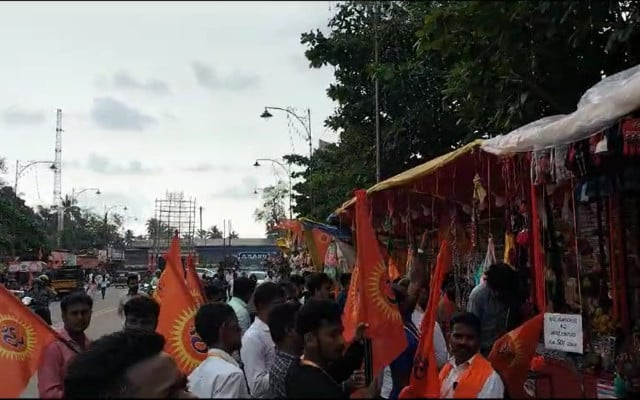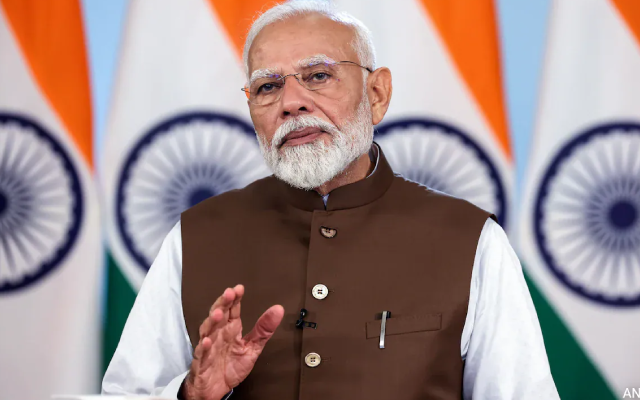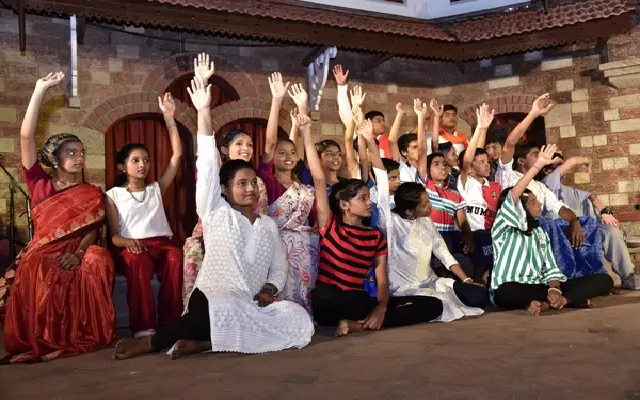Mangalore: Hindu devotees and members of the Vishwa Hindu Parishad (VHP) have raised concerns and objections over a recent decision to allow members of other religions to conduct businesses within the premises of the Mangaladevi Temple during its annual Navaratri festival. This decision has sparked tensions and led to a dispute in the city, bringing the role of religious practices and commerce into the spotlight.
The Background of the Conflict
The Mangaladevi Temple, which is dedicated to the goddess Mangaladevi, has a long history dating back hundreds of years. During the Navaratri festival, the temple draws a large number of Hindu devotees, and various businesses operate around the temple to cater to their needs. Traditionally, these businesses have been owned and operated by Hindus, and this practice has been ongoing for generations.
However, this year, a new initiative has been introduced, allowing members of other religions to participate in these businesses during the Navaratri festival. The Bajrang Dal, an affiliate of the Vishwa Hindu Parishad (VHP), vehemently opposed this decision, claiming that non-Hindus should not be allowed to conduct business within the temple premises during this sacred festival.
Sharan Pumpwell, the regional head of the VHP, argued that commerce around Hindu temples should be reserved for Hindus. He highlighted the significance of this tradition, stating that it has historical and religious importance for the community. “It is important for Hindus to have exclusive access to conduct business around the temple,” he emphasized.
The Legal Aspect
The VHP’s stance raises several questions about the legal framework that governs religious institutions and their surroundings. In India, religious endowments are subject to specific laws, and these laws dictate that temple premises should be reserved for activities related to the Hindu community. This includes provisions to ensure that only Hindus have access to businesses around the temple, reinforcing the notion of preserving the sanctity of religious spaces.
Opponents of the Initiative
The VHP and affiliated organizations argue that allowing members of other religions to engage in commerce during the Navaratri festival could compromise the integrity and significance of the festival. This objection highlights a broader issue of preserving the customs and practices associated with Hinduism, especially during religious celebrations.
The Communal Aspect
Communal tensions have flared up due to this disagreement. While the decision to permit members of other religions to conduct business during the festival is seen as a gesture of inclusivity and tolerance, some Hindu groups fear that it could lead to cultural appropriation and disrupt traditional practices.
In the past, businesses around the temple during the Navaratri festival have been largely operated by the Hindu community, which has upheld the tradition for generations. The change has raised concerns that non-Hindu business owners might not fully understand the customs and values associated with the festival, leading to misunderstandings and potential clashes.
The Response from Other Groups
In response to the VHP’s opposition, some members of the Communist Party of India (Marxist) have expressed their support for allowing Muslim traders, particularly those from economically disadvantaged backgrounds, to conduct business during the festival. They argue that opening up business opportunities to members of other religions is a matter of social justice and economic inclusivity.
The debate surrounding religious space and economic opportunities has sparked discussions about secularism in India and how different religious groups coexist in a diverse society. The conflict reflects the complexities of maintaining the delicate balance between the preservation of religious traditions and the principles of equality and inclusivity.
The Role of the Municipal Corporation
The Mangalore Municipal Corporation has stated that the area around the temple should be available to all residents, regardless of their religion, for commercial purposes. This assertion is based on the principle of non-discrimination and equal opportunity for all, as enshrined in the Indian Constitution.
Moving Forward
The debate surrounding the Mangaladevi Temple and the Navaratri festival’s commerce activities remains ongoing. It raises important questions about the intersection of religion, commerce, and inclusivity. As India continues to grapple with issues of communal harmony and religious freedom, it is crucial to find a balanced approach that respects religious practices while ensuring equal opportunities for all residents, regardless of their faith.
The city of Mangalore serves as a microcosm of the larger religious and social dynamics that exist across India, where a diverse population coexists, but occasionally faces tensions and challenges in finding common ground. The resolution of this particular dispute will be closely watched, as it may set a precedent for similar conflicts across the country. In the end, the pursuit of peace, tolerance, and communal harmony remains essential in India’s multicultural and multi-religious society.

















